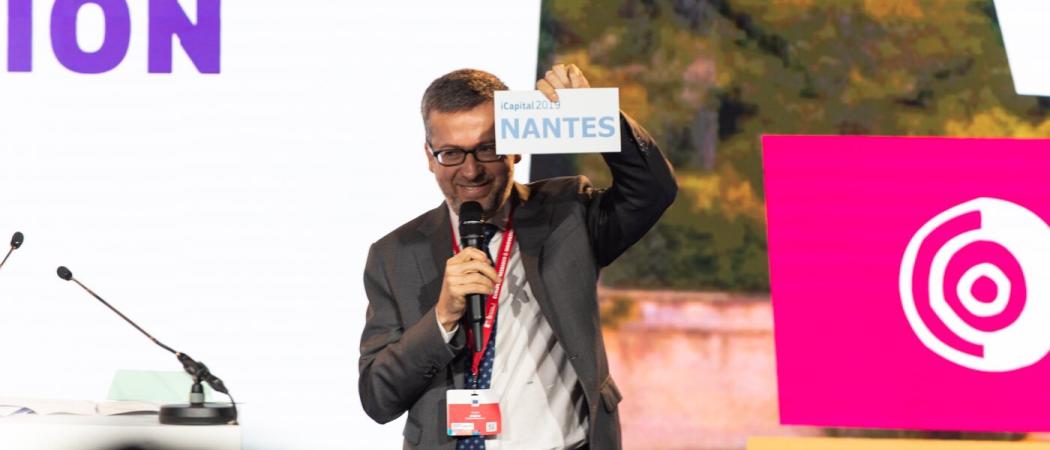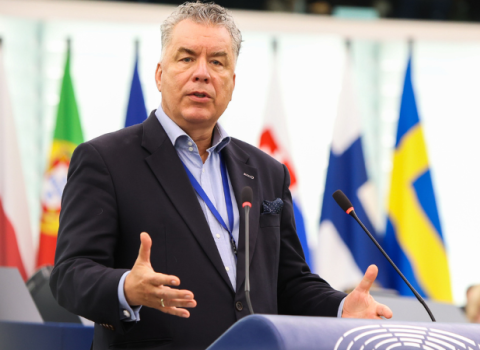European Commission hands out more than €3M in prizes to cities, start-ups, and EU grant holders

EU research and innovation commissioner Carlos Moedas presents the winner of the award at the R&I days conference in Brussels. Photo: European Commission
The European Commission named the French city of Nantes as the fifth annual European capital of innovation at its R&I Days conference this week. The city receives a cash prize of €1 million.
Nantes won for its scheme of putting its residents at the centre of designing new projects and policies for the city. Companies, experts and citizens come together at meetings and ‘Great Debates’ to discuss and develop new initiatives.
Fifty-three thousand people were involved in defining Nantes’ vision for an energy transition that makes use of 100 per cent local renewable resources and is entirely citizen-led. As part of this, 600 residents invested €120,000 in a renewable energy plant, MIN à Watt, which is composed of 3,000 metres of solar panels on the rooftop of a market in the city.
The scheme has led to a number of other ideas submitted by citizens becoming reality, for example, an unused chapel has been turned into an urban mushroom farm. The Nantes City Lab helps to test out new projects put forward by residents.
Five runners up in the city of innovation award - Glasgow, Bristol, Antwerp, Rotterdam, and Espoo in Finland - received €100,000 each.
Due diligence concerns
Other awards handed out at the R&I Days event were four Horizon impact awards, a €10,000 prize which recognises societal impact of projects funded through Horizon 2020 or its predecessor, Framework Programme 7.
There should have been five impact awards. However, an award to one EU grant holder was withheld because the project did not pass commission checks into the handling of its grant money.
Commission sources declined to name this fifth winner, but said they could yet receive the prize if due diligence concerns are addressed. If not, the prize will go to one of the other remaining five projects on the shortlist.
The four winners of the Horizon impact award are:
- Manno-Cure (Germany), which produced the first long-term drug treatment for the rare genetic disorder, alpha-mannosidosis, which causes various organ and tissue problems
- SAFE (UK), which developed a child abuse prevention programme
- Smart-Coasts (Italy), which develops practices for managing risks on coastlines, such as erosion and flooding
- CRYSP-TLS (France), which improved the transport layer security protocol used to encrypt online communications.
This is the first round of Horizon impact awards. The commission is planning to announce more next year.
Horizon Prize for Social Innovation
Danish company Walk With Path received the €1 million Horizon Prize for social innovation, awarded to projects that aim to improve the lives of older people whose mobility is impaired. Its product Path Finder, a shoe attachment, uses lasers to create visual cues to help people with irregular gaits walk more steadily. The attachment is particularly useful for people with Parkinson’s disease, who are afflicted with frozen gait, in which they are unable to move their legs forward.
Two runners up receive €250,000 each: Mob4Seniors, which developed MonToulouse Senior, an intelligent card that provides easy access for free, or at reduced prices, to a wide range of cultural, leisure, digital, sports and social services for senior citizens in Toulouse and its surrounding rural areas.
The second €250,000 award went to MyoSwiss, for the Myosuit, a lightweight multifunctional training device that provides people with muscle weakness support and stability in the hip, knees and ankle, like an external layer of muscles. The suit is used in rehabilitation and physiotherapy.
Horizon prizes are awarded for meeting a defined challenge. They are intended to act as an incentive for innovation, prescribing the goal, but not how it should be achieved. The Horizon prize for social innovation is a one-off award; there are currently no plans to repeat it.





 A unique international forum for public research organisations and companies to connect their external engagement with strategic interests around their R&D system.
A unique international forum for public research organisations and companies to connect their external engagement with strategic interests around their R&D system.